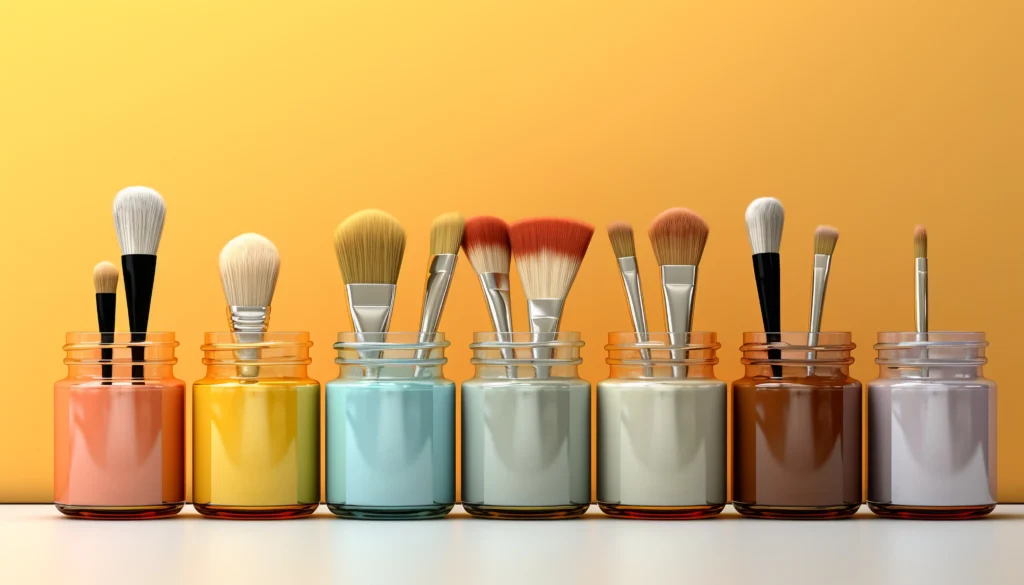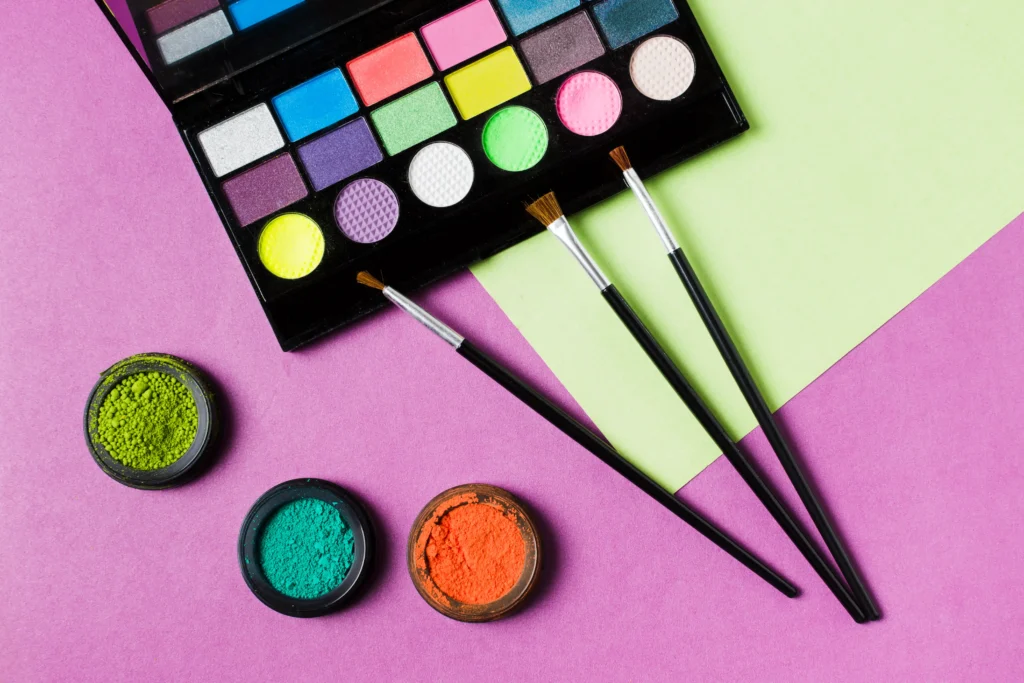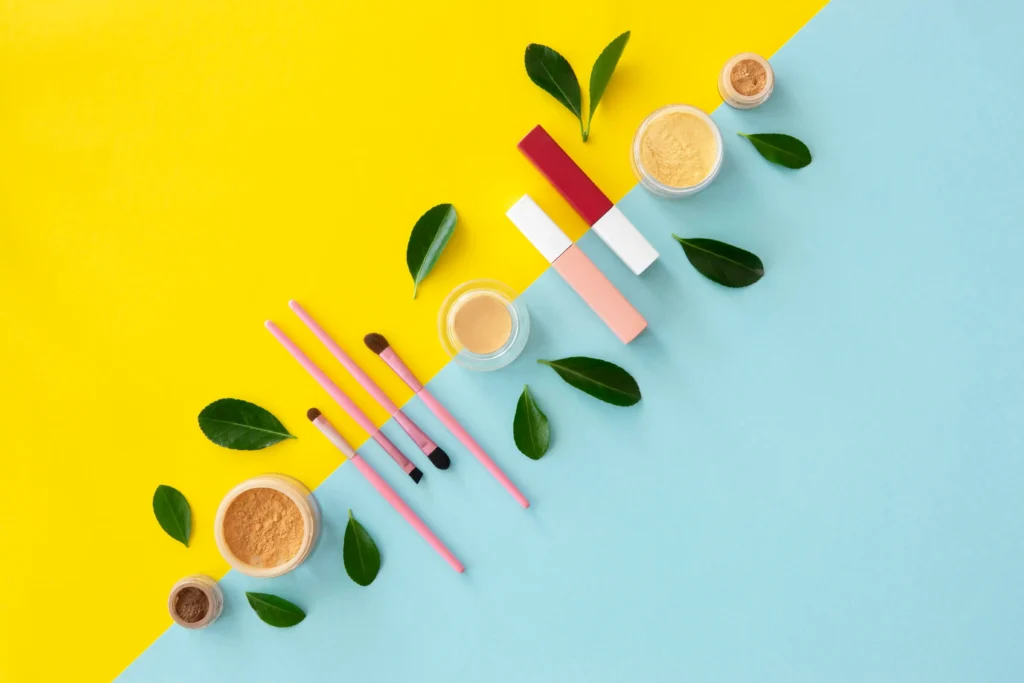Color cosmetics are likely the first thing you notice when you enter a beauty store—rows of lipsticks, eyeshadow palettes, and blushes that promise transformation. The signature red lipstick for a hot night or a soft nude for a job interview: color cosmetics define how we want to be seen.
Consider Rihanna’s Fenty Beauty, which changed the beauty series entirely by illustrating how diverse and strong color cosmetic brands can be. Or think about Glossier, a brand built entirely on social media buzz and minimal makeup looks. They proclaim that color is not only pigment; they convey identity and empowerment.

In 2025, consumers will prioritize sustainability, diversity, and self-love values over just following trends. New-age consumers have values regarding vegan ingredients, cruelty-free testing, and locally manufactured beauty.
That’s where Maker’s Row steps in. Whether you’re launching a lipstick line or eyeshadow palette, Maker’s Row helps entrepreneurs connect with USA-based factories and packaging experts to bring color cosmetics brands to life.
So, what exactly are color cosmetics? What are the types, trends, and best practices in 2025? Let’s break it down step-by-step.
What Are Color Cosmetics?
Color cosmetics are those makeup products that change and enhance your natural appearance. These include lipstick, blush, eye shadow, eyeliner, foundation, etc. Skincare is not included in this definition, as skincare is reserved for that which purports to improve the health of the skin. Instead, color cosmetics are all about enhancing beauty, style, and personal expression.

Color cosmetics add color to the face and define features differently. Bold red lipstick can make a strong statement, while a peach blush adds warmth to the skin. Whether it is the bold smoky eye for that night out or the softish foundation for your next professional meeting, all of these are achieved using color cosmetics.
Want to know How to Launch a Korean Cosmetics Brand in USA? Read this!!
Color cosmetics are made with pigments, oils, and waxes, and some have various skin-care ingredients. Most present-day brands of color cosmetics are into clean, vegan, and cruelty-free formulas, which make them safe for all skin types.
Main Categories of Color Cosmetics:
| Category | Purpose | Examples |
| Lip Products | Add color and shape to lips | Lipsticks, lip glosses, lip liners |
| Face Products | Even skin tone, highlight features | Foundations, blushes, bronzers |
| Eye Products | Define and decorate eyes | Eyeliners, mascaras, eyeshadows |
| Nail Products | Beautify and protect nails | Nail polish, nail art kits |
| Multi-use Items | Combine multiple uses in one product | Lip & cheek tints, highlighter sticks |
Fun Fact: The earliest use of color cosmetics dates back to ancient Egypt. Cleopatra was known to use crushed beetles for red lipstick!
In 2025, the definition of color cosmetics is expanding. Products now often contain SPF, vitamins, and moisturizers. They blur the line between skincare and makeup, offering both beauty and function.
So, whether you want a natural daytime glow or a glamorous evening look, color cosmetics are your go-to tools.
Why Are Color Cosmetics So Popular?
In 2025, color cosmetics are not just a trend—they’re a cultural movement. From teenagers on TikTok to celebrities on the red carpet, color cosmetics have become part of daily life.

Whether it’s a bright eyeliner challenge, a natural “clean girl” look, or bold festival makeup, beauty routines are now moments of self-expression. So why are color cosmetics more popular than ever?
Also read, Top 10 Korean Skincare Wholesale Suppliers for Small Businesses in USA
Let’s break down the reasons:
1. Expression & Identity
Makeup is no longer about hiding flaws. Today, color cosmetics are tools for self-expression. People use them to explore identity, mood, and style. A soft, dewy look might reflect calmness. A bold lip may say confidence. This emotional connection fuels product demand.
Example: Gen Z influencers often change their makeup to match how they feel—playful pastels for spring, edgy black eyeliner for concerts, or even gender-fluid makeup that breaks norms.
Fact: Over 60% of Gen Z consumers prefer buying from ethical color cosmetics brands, especially those made in the USA
2. Social Media Trends
Platforms like TikTok, Instagram, and YouTube are driving the beauty world. Viral challenges and tutorials make color cosmetics more visible than ever.

One 15-second video featuring a new blush or setting spray can generate thousands of purchases overnight.
Data: According to a 2024 Shopify report, 40% of beauty sales in the USA are influenced by social media content.
3. Inclusive Branding
Modern consumers want to see themselves reflected in marketing and products. That’s why inclusive shade ranges matter. The most loved color cosmetics brands offer products for every skin tone, age, and gender.
Example: Fenty Beauty launched with 50 foundation shades and earned over $100 million in its first few months.
This shift toward inclusivity builds trust and brand loyalty.

4. Vegan and Clean Ingredients
More buyers are reading labels. They want color cosmetics that are free from harmful chemicals, animal testing, and artificial dyes. This is especially true among millennials and Gen Z.
Stat: A 2025 Nielsen study shows 65% of makeup consumers prefer cruelty-free products. Another 58% look for vegan or organic labels.
Sustainable packaging also plays a big role. People want recyclable, refillable, and eco-conscious options.
Learn The 5 Biggest Mistakes Cosmetic Factories Make When Trying to Get More Clients
Growth of Color Cosmetics Brands in 2025
The demand for color cosmetics is creating room for hundreds of new brands. Small and mid-sized businesses are thriving thanks to e-commerce, influencer marketing, and niche positioning.

Trending Focus Areas:
- Clean formulas free from parabens and sulfates
- Hybrid products like tinted moisturizers with SPF
- Eco-friendly packaging with refills and recyclables
- AI & AR integration for virtual makeup try-ons
According to reports, the USA market for color cosmetics will be worth $12.5 billion in 2025 and growing at 5% annually.
How Maker’s Row Helps Color Cosmetics Brands
Starting a color cosmetics brand is exciting—but production, compliance, and sourcing can be overwhelming.
That’s where Maker’s Row comes in.
What They Offer:
- A network of verified USA manufacturers
- Help with prototyping and packaging
- Easy communication with suppliers
- Support for both small batches and large-scale production
For example, an indie entrepreneur wanting to launch a cruelty-free lipstick line can use Maker’s Row to find a local lab, source packaging, and ensure FDA compliance—all in one place.
By keeping production in the USA, brands can also meet faster turnaround times and respond to market trends more quickly.
🔗 Pro Tip: Use Maker’s Row to find suppliers who understand the unique requirements of color cosmetics brands.
Types of Color Cosmetics
Let’s look at the most common color cosmetics categories and their purpose:
| Product | Use Case | Top Brands |
| Lipstick | Defines lips, adds volume | MAC, Maybelline, Fenty Beauty |
| Foundation | Evens skin tone | Estée Lauder, NARS, L’Oréal |
| Blush | Adds flush and shape to cheeks | Rare Beauty, Milani |
| Highlighter | Enhances glow on high points of face | Charlotte Tilbury, Becca |
| Eyeshadow | Adds drama, depth to eyes | Urban Decay, Huda Beauty |
| Eyeliner | Defines eye shape | KVD Beauty, NYX |
| Nail polish | Colors and protects nails | Essie, OPI |
Real-Life Examples of Successful Color Cosmetics Brands
- Fenty Beauty – Launched by Rihanna, known for its 50+ shade foundation range. Set a new standard for inclusivity.
- Glossier – Started as a beauty blog, grew into a minimalist makeup line loved for its “no-makeup” makeup look.
- e.l.f. Cosmetics – Budget-friendly with viral success on TikTok. Expanded rapidly due to smart influencer campaigns.
- Rare Beauty – Selena Gomez’s brand focusing on mental health, clean formulas, and real skin acceptance.
These color cosmetics brands prove that authenticity, quality, and audience connection drive sales and loyalty.
How to Start Your Own Color Cosmetics Brand in 2025

If you want to build your own color cosmetics brand, follow this roadmap:
- Research your niche – Bold colors? Clean beauty? Hybrid products?
- Find a manufacturer – Use Maker’s Row for USA-based production.
- Formulate & test – Work with cosmetic chemists to create safe products.
- Brand and package – Invest in visuals, eco-friendly packaging, and storytelling.
- Build your online presence – Use social media, influencer marketing, and email lists.
- Launch and learn – Collect customer feedback and improve.
Final Thoughts
Color cosmetics are more than just makeup—they’re tools for identity, creativity, and connection. In 2025, the market is wide open for ethical, inclusive, and innovative color cosmetics brands. If you’re ready to launch your own brand, let Maker’s Row help you get started the right way.
Success in this space depends on product quality, brand storytelling, and your ability to respond to trends. With the right tools and partners, your color cosmetics brand can become the next viral sensation.
Color cosmetics are more than simple makeup; they are part of the identity, creativity, and connections. The market is huge for ethical, inclusive, and innovative color cosmetics brands to open in 2025.
Ready to open your own brand? Let Maker’s Row track you the right way.
This space also considers the quality of products, the capacity to tell a story about the brand, and the likelihood of being able to catch on to a trend. With the right tools and partners, your color cosmetics brand could become the next viral sensation.
